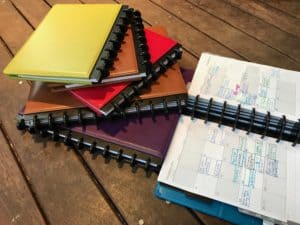The first step to getting a good grade on an assignment is to … wait for it … do the assignment!
Simple, right?
Maybe, but only if you remember to do the assignment. For some students, knowing how to keep track of assignments and their due dates is a huge challenge. Here, I’m going to explain how to keep track of assignments and projects, and give you some tips for staying organized. A cool angle to this is that what I’m going to be talking about is completely applicable outside of school. So if you’re not a student, but you still have due dates and project deadlines – pretty much like any human – then this system is for you, too.
How to keep track of homework assignments
1. Find a planner system and use it multiple times every day.
The KEY step for keeping track of homework, which I’ll get to next, is to write everything down. But before that happens, you need a place to write it all. You have three options here. 1) paper 2) digital 3) a combination of both. Personally, I use a combination of both. While I am a pen and paper person at heart, I do use Google calendar in addition to my paper calendar. I have a family and a business to run, so I need the digital aspect to be able to share calendars with other people. For my paper calendar I use the Staples Arc system. It’s cheap, simple, and super customizable.
I advise you to pick a system based on what’s convenient and easy, and not on what is cool. There are a gazillion list apps out there with fancy features — some of you may have heard of Evernote, the king of task management apps — but the goal is to keep it simple and use a system that you don’t have to stress about. If it’s too complicated, you won’t want to be bothered to even take it out when you need it. Whatever you pick, be sure it includes a monthly calendar and a daily calendar/agenda. Here’s why:
A monthly calendar allows you to see, at a glance, what assignments and appointments are coming up over the next few days or weeks or months. It’s key for long-term planning.
A daily calendar/agenda allows you to see and plan for what’s coming up tomorrow and in the very near future.
Whether you go for a dated calendar or an undated one (one you have to date yourself) is up to you. What size is up to you. (I use a half-sized one and a full-sized one!) Here’s a picture:

The cover and paper inside your planner is up to you. Whether you color-code your entries is up to you. (I do!) Make it something you’re excited to use, while keeping it simple.
It’s important to use your system multiple times a day because the more you use it, the more you trust it. And the more you trust it, the more it will work.
I’ve heard so many students say “I’ve tried using an assignment notebook and calendar, but it doesn’t work.” But when I ask them if they write everything down, they say no. And that’s why. So you’ve got to commit to your system. Use it multiple times every day. Get in the habit of checking it every morning or every night before bed so you know what’s on your agenda.
2. Write everything down. And the operative word here is EVERYTHING.
I have a theory that I’ve lived by for the longest time: Our brains weren’t made for storing information, but are instead made for creating and processing information. (Lol … it turns out that I’m not a genius and that I didn’t invent this theory.) Several scientific studies actually support the idea that to a degree we have a maximum brain capacity. And if we use up all that capacity for storing information and trying to remember everything … then there will be no brain energy left to create, think and process. So by writing things down, we get them out of our heads, which frees up space for us to be smarter and more creative.
Plus, there is just no way on earth that we can remember every little detail of what’s due when, as well as the time and date of your next doctor’s appointment. If something comes up and you’re not sure whether to write it down, write it down!
Here’s what you should be keeping track of:
- Daily homework assignments (short-term)
- Project due dates (long-term)
- Upcoming tests/quizzes
- Books that have to be read by a certain point
- Appointments (doctor, dentist, guidance counselor, coach, etc.)
- Things you’re supposed to remember to do (ie: talk to math teacher)
- After-school activities, sports (even if you have practice every day from 2:30-5, block out that time on your calendar)
- Weekend activities
- Job hours
Here’s another important tip: write assignments down the moment their assigned, and write appointments down the moment their scheduled. Do NOT tell yourself that you’ll remember to write it down later. Doesn’t work! Plus – that defeats the purpose: you don’t want to use your brain to remember. If you don’t have your paper agenda with you when something comes up, then set a reminder in your phone to write it down later, or write the assignment down on a sticky note and put it somewhere you won’t forget. Then, transfer the information into your planner the moment you get home.
3. Set up reminders.
Let’s say you have a project due in one week, so you write down “biology project due” on your calendar on the date it’s due. Sound good? No! No, because you don’t want to end up checking your calendar on the project’s due date and realizing “Oh crap! It’s due today!” So the hack for remembering to do the assignments you write down is this: remind yourself along the way.
You can do this several ways, depending on your system. If you’re using digital, like a phone, use the default reminder app to remind yourself of the project at least a few days before it’s due. You can even set up several reminders throughout the week. If you’re using a good old paper calendar, then in addition to writing down “project due” on the actual due date, write in several reminders to work on the project on the days leading up to the due date.
A reminder system also helps you manage your time for long-term assignments because it encourages you to work a little bit each day towards the larger goal.
4. Keep your planner/calendar accurate and up-to-date.
Your homework management system is only going to work if it’s accurate. So you’ve got to be sure that you update your calendar and your agenda as things change. So if your teacher gives an extension or changes the due date of a project, or if your band concert or meeting is rescheduled, make those edits in your calendar. (Try to keep it neat if you’re using a paper system, so that might mean using whiteout. Messy on paper equals messy in the head.) And remember the rule: make these changes immediately if possible.
If you end up using a combination of a digital system and a paper system, make sure you sync the two systems daily. I have run into the problem where I’ve added an appointment in my phone, but then forgot to add it to my paper calendar, and then I totally forgot about it. Oops! So I make it a habit to review both calendars/agendas every night to make sure they both contain the same information.
How to keep track of homework assignments: Extra tip
There are going to be times when you fall off the bandwagon and let your system slip. You might go a few days or even a week without writing things down – either because you forget or you keep telling yourself that you’ll do it later. But don’t give up on your system. Just pick up where you left off and get back to writing down every little detail. Whenever you wander away from your system, bring yourself back to it, and don’t judge yourself.
Also, these moments can be learning opportunities! Whenever you stop using your agenda or calendar, ask yourself why? Why did you stop? What part of the system wasn’t working? If the system was easy enough to use, you wouldn’t have stopped. Is your notebook so big that it’s annoying to bring with you? Then get a smaller one. Are you not writing assignments down because you don’t have enough space in the “Daily Agenda” part of your notebook? Then get a notebook that gives you more room to write down your daily tasks. Did you think you were a techie, but find the app stuff too complicated? Or vice versa? Then switch systems. Modify as you go. You won’t come up with the perfect system right away, but you will instead figure out what works for you as you go. Be open to change.
So those are my 4 strategies for how to keep track of homework assignments. If you have some strategies of your own, then please share them in the comments below!

